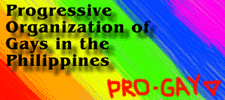 |
 |
 |
 |
|
A
Gay Assessment of the Ramos Government 3 June 1998 THE regime of President Fidel Valdes Ramos is wrapping up its six-year rule in June, leaving behind the legacy of the most weeping scale of restructuring of the economy and state to conform to corporate globalization, which all 11 previous regimes backed by the United States and Japan accomplished only in piecemeal fits and starts. With the tools of trade liberalization, deregulation and privatization, the Ramos government transferred not only all major public patrimonies to intrusion by huge corporate interests, but enabled even the pettiest carpet-baggers to lay claim to services and assets of marginal productive potential or profitability. Unprecedented unanimity of onerous interest in Congress passed the greatest volume of laws and treaties, the most comprehensive legal framework that repealed all pretenses to protection for the masses. Strategic laws governing food, finance and trade, raw material extraction, labor market and international relations redefined the already weak nation-state into a mere economy. Grounded inside this macro-economic upheaval is the final deconstruction ofattempts, real or imagined, by the Philippine government at social reform. Archaic legislation such as those for land reform, forestry, mining, oil industry, even retail trade, already anti-people but retaining tiny provisions for economic protection, are being rewritten to fit the march towards a free trade regime, less government role in the life of the nation and more perks for private businesses. All these the technocratic-oriented administration accomplished by co-opting potential middle-class opposition by opening leaks from where the sector can share alongside the cash flows induced by globalization. Upwardly, mobile consumers with virtually no awareness of neo-liberalism as a threat are content behind a façade of formal democracy which masked widespread violations of economic and social rights among the lower classes. However, the short-lived prosperity unravelled last year, driving a wedge of disaffection between the middle class and the market reforms embodied by Ramos. The Ramos presidency depoliticized and "decollectized" human rights in two ways. First, by trivializing the standards of observance to a legalistic litigation-based pursuit of personal justice, a form reduced to the barest minimum of civil liberties that were themselves attacked with police-state measures such as arbitrary searches and the national identification system. Second, Ramos chose to plead the republican concepts of separation of powers when faced with demands from disadvantaged sectors for the state to wield political will in resolving social conflicts, thus complainants are shunted to judicial or quasi-judicial bodies which may rule but not compel the executive to implement rulings. Predictably, the supposed hands-off policy is absent when he and his cronies need to short-circuit economic decisions that will reward the privileged classes. At the same time, development funding financed tri-partite workshops on almost any social concern, that subtly introduced "legal reforms" disguised as streamlining of the justice system, a process that increased the rights of legally created "persons" (corporations and firms) as more superior than those for natural persons who may want to challenge corporate acts. Some of the outputs of these consultations have been translated into high-sounding "magna cartae" on academic freedom, indigenous people's rights, fisheries management and gender relations that lend the illusion of an enriched civility in direct proportion to the volume of new laws passed. The root causes of man-made disasters, epidemics, famines, economic displacements and conflict are delinked from the accountability of corporate and state bodies which reduce these to a social marketing exercise. Thus huge crimes such as the Marcopper spill and the Public Estate Authority (PEA)-Amari pay-offs scandal are made to appear resolved by convening workshops or congressional hearings that lead to nowhere. By manipulating statistics to justify rewarding the Philippines a rating in human development indices, the Ramos regime successfully dodged culpability for violating its own laws and the international conventions to which the Philippines is a signatory. At the same time, opposition is crushed by criminalizing human rights advocacy, to remove its political nature. Despite these machinations, however, the struggle to enrich human rights to make it meaningful for the broad masses has managed to break through and win concrete gains that prevent unnecessary death and suffering. The survival and reestablishment of classic human rights advocacy, with all the attendant difficulties that a radically changed legal system brings, rests on the people who need justice more than ever in the chaotic era of globalization. They are multitudes of peasants and workers who make up the great majority of the developing world's peoples. The struggling people of which Pro-Gay plays a humble part are representative of such a revivalist liberating movement of people.### |
|
|
|
|
|
|
|
|
|
|